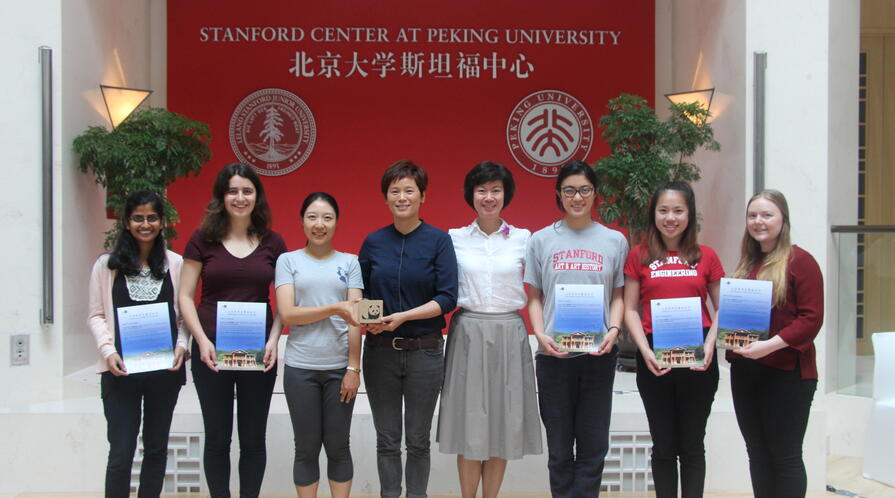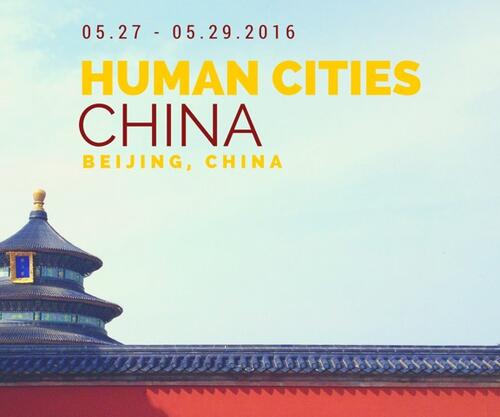In May 2016, practitioners, researchers, and students will gather in Beijing, China for Human Cities@China to explore alternative pathways for an urban vision in China and one that ultimately creates a more sustainable and human-centered city. Drawing from the theme, Design, Build and Measure the Human City, we invite key experts to engage with American and Chinese students to share case studies and development models that promote urbanism at the neighborhood level. We explore the integration of new technologies and practices of community-scale infrastructure in both greenfield and infill development, as well as compare approaches to urban development in large cities and mid-sized townships. We will discuss how urban design strategies such as density, walkable streets, mixed land use, and small blocks can increase quality of life for people in daily interactions with their neighbors, community institutions, and the built environment. By learning from practitioners’ and developers’ firsthand experiences, attendees will meet new colleagues and collaborators, gain insights into the opportunities and challenges of urban development in China, and explore a framework to advance the human city.
Keynote Speakers:
Dr. Qin Shao, Professor of History, College of New Jersey, Author of Shanghai Gone
Stephen Wong, Managing Director for EWD, Chairman of Chongbang Group
Forum and Roundtable Speakers:
Liqun Chen, China Center for Urban Development, China Crowdsourcing Placemaker Initiative
Dr. Ying Long, School of Architecture, Tsinghua University, Beijing City Lab
Dr. Jing Jing Xu, China Development Bank Capital, Global Green Development Capital
Matthew Hu, Courtyard Institute
Amy Mathieson, China Building Restoration Project
Schedule: http://www.humancities.org/schedule
Speakers: http://www.humancities.org/speakers
Registration required for events open to the public
Register here: https://deland.typeform.com/to/MvBiKA
For more information, visit www.humancities.org/china
Human Cities@China is sponsored by the Stanford Office of International Affairs and organized by the Stanford Human Cities Initiative and Program on Urban Studies with support from Tsinghua University iCenter, Tsinghua Academy of Art and Design, Tsinghua University Department of Construction Management, the Stanford Center at Peking University, Stanford Bing Overseas Program, and the Urban Land Institute.
In May 2016, practitioners, researchers, and students will gather in Beijing, China for Human Cities@China to explore alternative pathways for an urban vision in China and one that ultimately creates a more sustainable and human-centered city. Drawing from the theme, Design, Build and Measure the Human City, we invite key experts to engage with American and Chinese students to share case studies and development models that promote urbanism at the neighborhood level. We explore the integration of new technologies and practices of community-scale infrastructure in both greenfield and infill development, as well as compare approaches to urban development in large cities and mid-sized townships. We will discuss how urban design strategies such as density, walkable streets, mixed land use, and small blocks can increase quality of life for people in daily interactions with their neighbors, community institutions, and the built environment. By learning from practitioners’ and developers’ firsthand experiences, attendees will meet new colleagues and collaborators, gain insights into the opportunities and challenges of urban development in China, and explore a framework to advance the human city.
When: Friday, May 27, 2016, 10 am to Sunday, May 29, 2016, 4:30 pm
Where:
* Friday, May 27 Human Cities@ China Kick-off at Tsinghua University
* Saturday, May 28 - Deep Dive in the Community at Tsinghua University
* Sunday, May 29 - Human Cities@ China Final Showcase at the Stanford Center at Peking University
Admission: Open to the public but registration is required. Register at https://deland.typeform.com/to/MvBiKA
Keynote Speakers:
Dr. Qin Shao, Professor of History, College of New Jersey, Author of Shanghai Gone
Stephen Wong, Managing Director for EWD, Chairman of Chongbang Group
Forum and Roundtable Speakers:
Liqun Chen, China Center for Urban Development, China Crowdsourcing Placemaker Initiative
Dr. Ying Long, School of Architecture, Tsinghua University, Beijing City Lab
Dr. Jing Jing Xu, China Development Bank Capital, Global Green Development Capital
Matthew Hu, Courtyard Institute
Amy Mathieson, China Building Restoration Project
Schedule: http://www.humancities.org/schedule
Speakers: http://www.humancities.org/speakers
Registration required for events open to the public
Register here: https://deland.typeform.com/to/MvBiKA
For more information, visit www.humancities.org/china
Human Cities@China is sponsored by the Stanford Office of International Affairs and organized by the Stanford Human Cities Initiative and Program on Urban Studies with support from Tsinghua University iCenter, Tsinghua Academy of Art and Design, Tsinghua University Department of Construction Management, the Stanford Center at Peking University, Stanford Bing Overseas Program, and the Urban Land Institute.


 FSI researchers examine the role of energy sources from regulatory, economic and societal angles. The Program on Energy and Sustainable Development (PESD) investigates how the production and consumption of energy affect human welfare and environmental quality. Professors assess
FSI researchers examine the role of energy sources from regulatory, economic and societal angles. The Program on Energy and Sustainable Development (PESD) investigates how the production and consumption of energy affect human welfare and environmental quality. Professors assess  报名可扫描二维码
报名可扫描二维码



